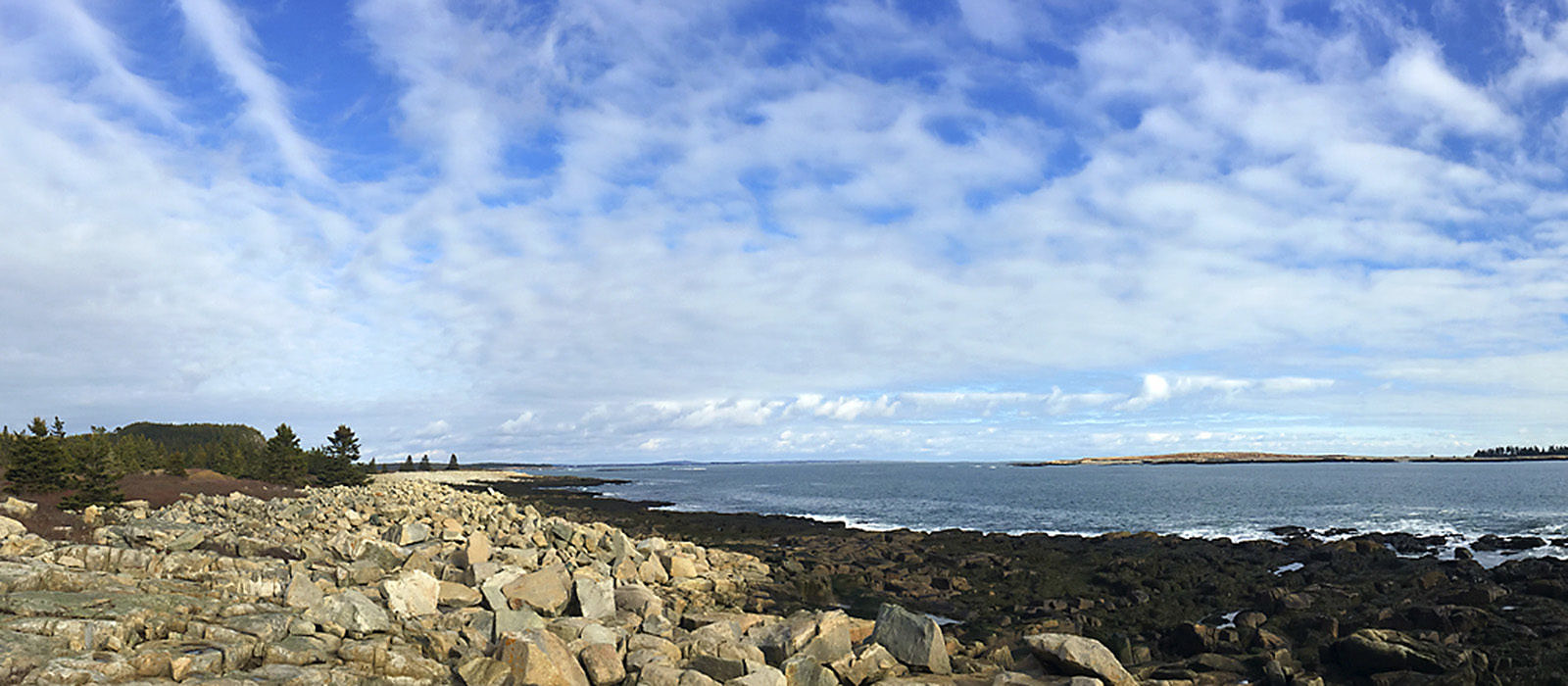
Purple Sandpipers, Orange Lichen and Donald Trump
By noon on Inauguration Day, as Donald Trump took the oath of office, I had already left the continent. Here at Schoodic Point, in Maine’s Acadia National Park, the tides on Friday were in my favor — dead low at 11:09AM. So I stepped away from the shoreline and walked the intertidal zone, over squishy clumps of rockweed and knotted wrack, over blue mussels and periwinkles, until I reached Little Moose Island offshore. There, alone during the peaceful transition of power, I made peace with this new presidency and took my own oath: to solemnly swear that I will preserve, protect and defend the wildlife and wild places of the world.
Little Moose Island is good place to start. About two miles around, and all of 54 acres, the island is community of bedrock and bog, salt marsh and shrubland, waves and white spruce. Cool in summer, windswept, foggy and rainy, Little Moose is an outpost for boreal plants reaching their southernmost limits here offshore in Maine. For how much longer, we do not know. The waters in the Gulf of Maine are warming faster than almost any ocean region on earth.
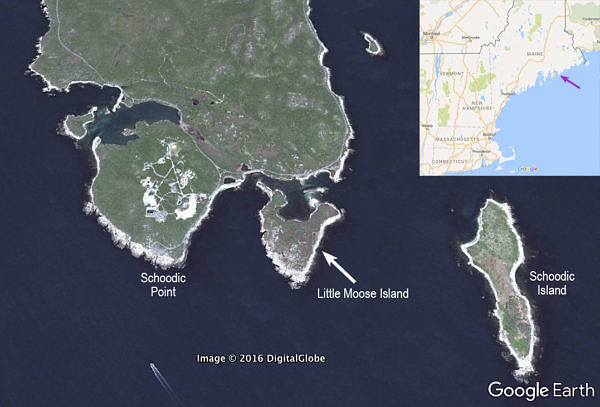 Following a narrow path or stepping only on exposed granite, I walked through stands of shrubby Jack Pine and creeping Juniper, past shag carpets of Black Crowberry and over orange lichens sprawling across pink granite. On this island rising to 54 feet above sea level, I probably (unwittingly) passed by withered, brown tufts of Marsh Feltwort or Mountain Sandwort — plants that grow much farther north or way higher in elevation.¹ No matter that I couldn’t identify everything growing or dormant or decaying around me on Little Moose.² At noon on Inauguration Day, I dwelled in the American Arctic, wide and flat with an Atlantic-sized horizon of promise.
Following a narrow path or stepping only on exposed granite, I walked through stands of shrubby Jack Pine and creeping Juniper, past shag carpets of Black Crowberry and over orange lichens sprawling across pink granite. On this island rising to 54 feet above sea level, I probably (unwittingly) passed by withered, brown tufts of Marsh Feltwort or Mountain Sandwort — plants that grow much farther north or way higher in elevation.¹ No matter that I couldn’t identify everything growing or dormant or decaying around me on Little Moose.² At noon on Inauguration Day, I dwelled in the American Arctic, wide and flat with an Atlantic-sized horizon of promise.
Meanwhile, in Washington, President Trump was promising an end to the “American carnage,” even as he and his cabinet prepare to unleash a new era of carnage on the American Constitution, on civility and against the environment. Trump’s “America first” proclamation, will probably put the environment last. His is a declaration of war on clean air and water, on wildlife diversity and on some of our most sacred places.
That’s not to say that I can deny finding occasional odd satisfaction amid the uncertainty and fear. There is pleasure in watching entrenched Washington power — Democrat and Republican alike — squirm beneath the iron heel of Trump’s rhetoric. Like almost everyone, I harbor no sympathy for Congress. None. Nor, still, do I reserve any for Trump, even when he stumbles in the dark on the worthy messages: drain the swamp, health care for everyone, jobs for Americans. Right messages; wrong messenger.
So as I ponder all this on Little Moose Island, and think about a place for myself during the next four years, Purple Sandpipers, about 60 of them visiting from the Arctic, careen above the waves offshore. A Rough-legged Hawk, also an Arctic messenger, hunts for mice or voles over on Schoodic Island, another island retreat a mile out to sea. I wish I could walk there as well.
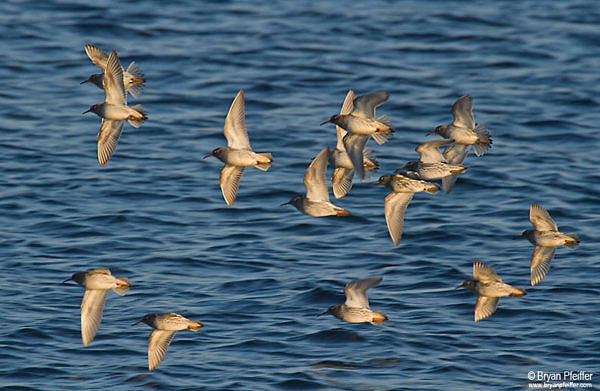
Purple Sandpipers / © Bryan Pfeiffer
Yet by 2PM Donald J. Trump is our new president. The tide, now incoming, will soon block me from the continent.³ So I wander back from this echo of the Arctic, back to a new America, back to a new world, back with a nascent, humble plan to join the resistance.
I suppose I could begin with the routine optimistic admonitions: a quote from Rebecca Solnit’s Hope in the Dark, for example, or faith that reason and love can prevail. Yeah, those are all good. Yet even before this ugly election, even if Hillary Clinton or Bernie Sanders had won, I had concluded that the fight against climate change was already lost (owing to our unending carbon addiction) and that millions of people will suffer horribly as a result. And no matter who’s running the world, extinction will continue apace under our watch, until we ourselves blink out like the Neanderthals and the earth, after the Anthropocene, gets back to its business. (Hey, a mere 10,000 years ago Little Moose Island sat beneath a mile of glacial ice; not much diversity there.)
By the way, I deny President Trump’s supporters neither his legitimacy nor their exuberance. Good for them, even as I believe he will be bad for the world. Instead, to be faithful to my oath, I’ll do what people tell me I do best: write about and share nature. And when that’s not enough —and it isn’t enough — I’ll do or suggest a few more things. For now, here are three:
- Read reason. We used to say that TV rots the brain. But the brain-rotting has new screens. So please wander away from social media and use your screen or the printed page to gain wisdom and find beauty in books. By way of an example, I’m now reading: The Lemon Tree by Sandy Tolan, non-fiction that reads like a novel, about the roots of the Arab and Jewish tragedies in the Middle East expressed in the lives of two families; and The Moth Snowstorm: Nature and Joy by Michael McCarthy, about the wonder and awe of nature and the visceral pain of its demise.
- Find perspective and hope from older and younger people around you. I found it during walks with my friend John Wires until he died at age 91, and during vibrant conversations (while drinking scotch whisky) with ninety-something farmer, author, conservationist and artist Jane Curtis, whom Ruth and I plan to visit soon in Woodstock, Vermont. I continue to draw inspiration as well from my students in the Field Naturalist and Ecological Planning programs at the University of Vermont (UVM). We’re sending them off to join us all on the mission to help make the world a better place; if they can’t do it, nobody can.
- Protest in the best way you are able. I’m a retired newspaper journalist who now teaches public communications skills to those students at UVM. In seminars starting this fall, I intend to bring those communications and media skills to people and non-profit groups working toward human and ecological justice, so that they can fight the good fight with greater tenacity and success.
Oh, one more thing, which almost goes without saying: Get outside — often. And try not to drive around so much, especially us birdwatchers (about whose role I shall write soon). I ride the bus to UVM and walk to my office in Montpelier. Yeah, of course, I drove to Maine for this working retreat. Guilty. But the truck stays parked as I walk the trails or tidal zones here at Schoodic Point every day. I recognize that you all can’t do that. But try to drive less so that you can see more, even the prosaic in your own home cities and villages.
On my way walking back from Little Moose Island, I stopped to photograph what might count as my orange tribute to President Trump, or to optimism, or even to both: a patch of what is most likely Maritime Sunburst Lichen (Xanthoria parietina).⁴ There it is below — a second sunrise on a dark Inauguration Day.
After that, as the tide came in, I stopped to dwell among the beauty and color in the diversity beneath the shallow, rising sea — and to share it with you here.
The tide rises. So what’s in your oath?
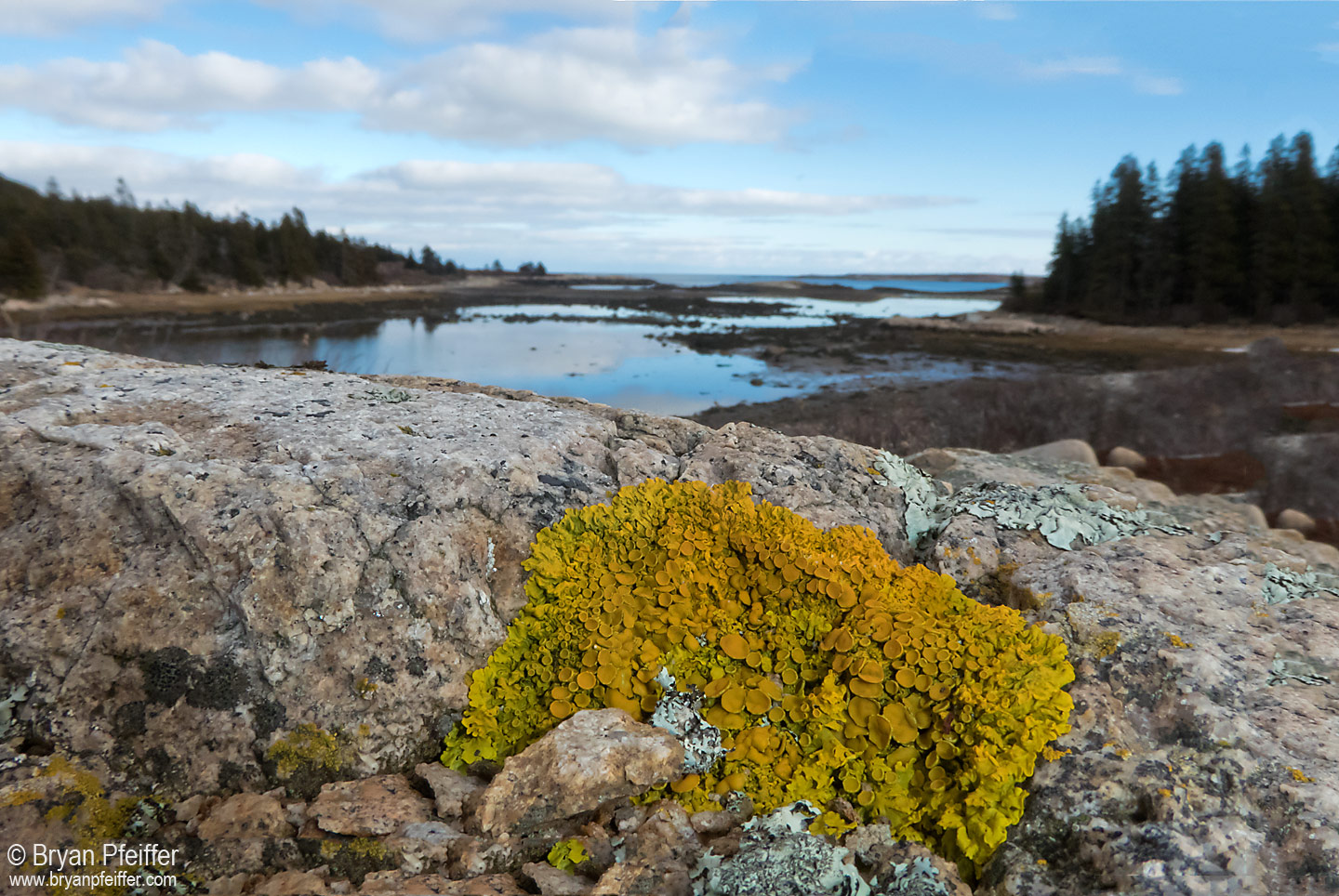
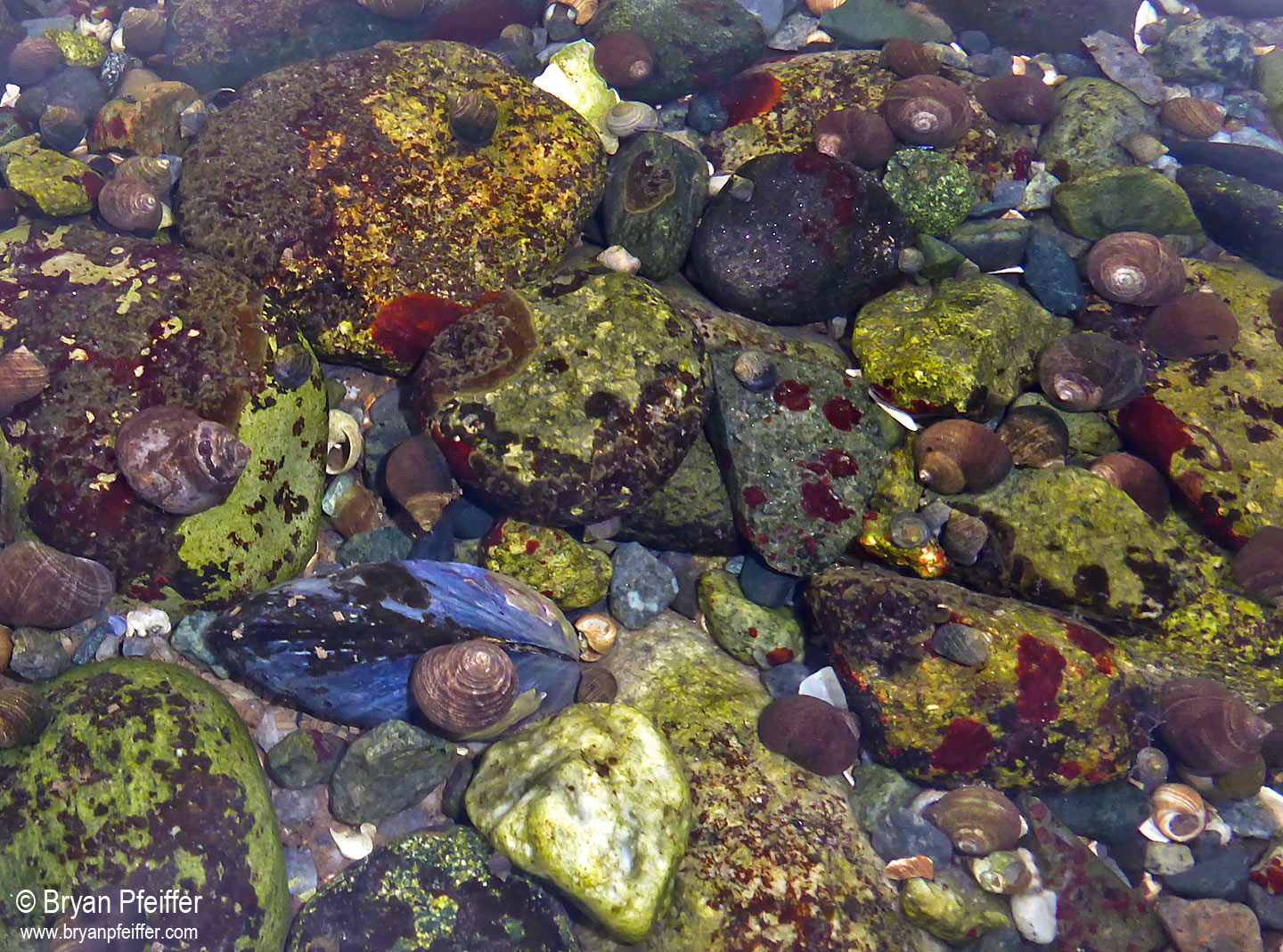
Notes, Credits and References
¹ Coffin, T.E., H. Tyler, L. Gregory. An Evaluation of Sites Representing Headlands and Islands with Plant Communities of Arctic-Alpine Affinity in the New England-Adirondack Region for their Eligibility as Natural Landmarks. Draft report. September 1989.
² If only I could have consulted on plants with local botanist Jill Weber, who was off in Washington at the demonstration (can’t blame her).
³ Yes, geologically, by way of tectonic plates, I did not leave the continent — just the shoreline. Close enough. You know … literary license.
⁴ Thanks to lichenologist and bryologist Mark Rahill for confirming my suspicion on this lichen.

Beautifully written article, Bryan! I loved reading every word. I, for one, am waiting impatiently for the first dragons and damsels to fly here in Tennessee. WIll see you in July in Maine for the Dragonfly workshop.
Congrats. Yeah, we all need to lose the internet now and then. See you when the insects fly!
I missed this, because we were in Trinidad on inauguration week, and blessedly lost the internet for a few days to boot. What a terrific piece, Bryan. I am still exploring my reaction to this presidency; I’ve been more politically active in the last 3 weeks than in my entire life beforehand. Thanks for the reading suggestions. Look forward to seeing you at Eagle Hill. (PS I’ve got one Trinidad dragonfly pic to share with you.)
It was great to see you, Leda Beth, and to meet Pat. Sounds as if you’re spreading the goodness out there. Hope to see you again next time I get Down East!
Thanks so much, Elizabeth. Wow, I didn’t know Rick had done that. Quite an honor!
Bryan, I appreciate your blog post and photos very much, and I am also grateful you posted this quote from Rebecca Solnit. It’s so true; action helps with hope. I struggle with hope, with everything going on around the world, and all the demoralizing environmental news. I just hope enough people act, in the right ways, and in time. I thank Rick Paradis for sharing your blog this morning with the faculty and staff at UVM’s Environmental Program.
My oath is to continue resisting as I have the ability, to share nature with people as I am able, and encourage people to eat more plant-based in a non obnoxious way when I get the chance. Thank you so much for this Bryan! Dave and I love reading your posts and especially appreciate this one. I’ve thought it too late for some time but am still drawn to do what I can just in case. I even get hopeful once in a while.
What is left of Nature is my salvation. I tried to study lichens some time ago but found that most guides require you to collect them and do chemical tests on them. But I love to admire their beauty and there are truly spectacular ones around on the mountains of Acadia.
It was great to see you at the brown bag lecture, we and my friend Pat were very glad we came.
Thanks, Kit. Here’s what Rebecca Solnit wrote about hope:
“Hope just means another world might be possible, not promised, not guaranteed. Hope calls for action; action is impossible without hope. At the beginning of his massive 1930s treatise on hope, the German philosopher Ernst Bloch wrote, “The work of this emotion requires people who throw themselves actively into what is becoming, to which they themselves belong.” To hope is to give yourself to the future, and that commitment to the future makes the present inhabitable. Anything could happen, and whether we act or not has everything to do with it. Though there is no lottery ticket for the lazy and the detached, for the engaged there is a tremendous gamble for the highest stakes right now. I say this to you not because I haven’t noticed that the United States has strayed close to destroying itself and its purported values in pursuit of empire in the world and the eradication of democracy at home, that our civilization is close to destroying the very nature on which we depend—the oceans, the atmosphere, the uncounted species of plant and insect and bird. I say it because I have noticed: wars will break out, the planet will heat up, species will die out, but how many, how hot, and what survives depends on whether we act. The future is dark, with a darkness as much of the womb as the grave.”
I know you like the woods and the wetlands (lots of ducks there), Philo. So do I. But, yep, the Maine coast — were it not for Vermont, I’d probably live here.
It’s on my list! Thanks, Dudley!
Thanks, Kim. Yes, I couldn’t attend a march either — so I guess I was marching out there on the island. Hadn’t really thought of it that way. I suspect you’ll marching around Cabot and Greensboro! 🙂
See the world, care for the world; care for each other. Well said. Thanks, Sue!
I’ve always disliked those collective nouns, especially “murder.”
An honor to hear from you, Laura. Thanks for being “out there” with us all.
Thanks, J & J. Nice to say it in this setting.
thank you bryan, you say it so well! j&j
Brian, I’m an admirer of anything you have to say and this is spot-on. Thank you for your encouragement to keep our faces forward, of learning and gaining hope, and making sure we stay out of doors.
strat douthat Brian, our chickadees, nuthatches and occasional woodpeckers (and, oh yes, the ever watchful blue jays and crow congress (a congress one can admire) salute you…
yes… our oath; more time out our door and into the ‘accidental wilderness’ of Quabbin. We walk. We sit and listen. I take photos of the great and small. We care for others.
Thank you Bryan for so eloquently expressing my dismay. I didn’t join the marches, but appreciate them for what they are trying to do. I don’t hold out much hope for any resistance, but, hey, maybe we can all climb out of our fear and apathy to actually make some difference. Thank you also for the reminder to not drive so much and even more for sharing your thoughts, reads, and photos. Decreased driving is a bit tough to figure out when living in Cabot and working in Greensboro.
Envious of those purple sandpipers! Add to your protest reading list: Claude Arbour’s “Choosing Wildness: My Life Among the Ospreys.” Stay warm and hopeful!
Thank you Bryan for the memories. When I lived in South Addison, I explored and met many many fellow travelers in places like Little Moose Island from Acadia NP to Quoddy Head. Our most frequent place to visit was Great Wass Island Preserve but the coast of Maine is like no where else we have been.
Love this, Bryan. Just what I needed to read right now. Thank you for helping me feel I can move forward despite it sometimes feeling like the world is imminently coming to an end.
thank you Bryan for your musings and gorgeous photos. Today’s marches fill me with hope. There are many of us who will ultimately prevail over hate and anger.